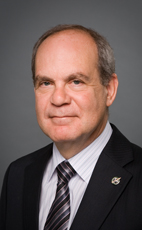Mr. Speaker, I thank my colleague for her interest in this matter. I appreciate the opportunity to respond to some of the comments she made.
Particularly, I want to address the issue of science and how the future of the fishing industry depends on science. I think we agree on this question.
Our department is a science-based organization. In fact, at Fisheries and Oceans Canada excellence in science is the cornerstone of all our operations. That does not mean, however, that we should simply rely on the ways of the past. As a department we cannot stand still in how we approach our scientific mandate. Therefore, over the past year we have implemented changes in how we organize and manage our scientific resources. As a result, there are more opportunities than ever for our scientists to work collaboratively in multidisciplinary teams to address complex multi-faceted challenges.
More to the point, we are using our science assets more strategically. This allows us to strengthen our regulatory capacity and explore new approaches for meeting our crucial oceans management and marine and fish habitat conservation and protection mandates.
The Canadian government is consistently working with our partners domestically and internationally to ensure that future generations inherit healthy oceans and ocean resources. We are protecting our ocean resources on a number of fronts and we are achieving real results.
Scientific knowledge and consultation with our stakeholders will continue to be the basis of our policies. This knowledge and experience will be vital as we continue our work to protect Canada's diverse marine and aquatic resources.
Fisheries and Oceans Canada is committed to the conservation and sustainable use of our ocean resources using the best science possible. To do that we depend on our scientific institutes, laboratories and centres of expertise for vital information to make fisheries conservation decisions that are both environmentally sound and economically productive. We will continue to use the knowledge gained from our scientific research to inform decisions and policies that meet the needs of the present without compromising the ability of future generations to meet their needs.
Given the current financial environment globally, within Canada and within government, it makes good sense to step back, re-calibrate and set a new direction. Therefore, over the past year we have reviewed all of our policies, programs and services. That will ensure they are consistent with our core mandate, relevant to Canadians and effective and efficient in meeting our objectives. In short, we have been moving forward, not backward. Even better, we have been moving forward as a department, together with our partners and stakeholders. That is something in which we can all take pride.
What I am saying is this. Deficit reduction is a challenge, but it is also an opportunity for renewal and transformation. We need to take advantage of this opportunity to take a hard look at ourselves to find better ways to do things. We need to ask ourselves what our core business should be, what the right capacities are, and whether there are better systems and ways of delivering services that will help us keep delivering excellence to Canadians and meet the many demands of the 21st century.
I can assure the House that our future investments in science will be designed to augment our research capacity and assure sustainable fisheries and trade into the future.

